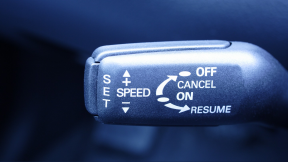What is a digital license plate?

Quick insights
- Digital license plates allow drivers to register and renew their license plate from anywhere with the help of a smartphone app.
- These tech-enabled plates are being legally issued in several states, with many more states in the process of settling legislation.
- Digital plates may be especially useful for commercial purposes, as the practicality multiplies for businesses with an entire fleet of vehicles.
For many drivers, keeping a vehicle’s license plate up to date is a regular source of annoyance. Registering and renewing license plates has historically involved taking time away from work or personal affairs to stand in line at the DMV. Recently, a California-based tech company began working on a solution that would allow vehicle owners to update their plates instantly with the help of a smartphone-enabled app.
While digital plates are still far from commonplace, several states have approved their use, with many more in the process of determining legislation. In this article, we’ll address the features offered by digital plates, the costs associated with them and a discussion of their practical uses in the real world.
How do digital license plates work?
Digital license plates are battery-powered monochromatic screens that can be easily installed and managed through a connected smartphone app. The screen can be switched between light and dark mode, with the small space below the plate lettering reserved for custom messages or alerts. Digital plates also include location tracking, making it easier to find a vehicle if it’s been stolen, or monitor trips for speed and mileage. While individuals with a single car may find these features useful and appealing, the potential practicality multiplies for commercial organizations. For companies managing a fleet of vehicles, digital license plates may help maintain vehicle compliance and budgeting more efficiently in terms of both time and cost.
Are digital license plates legal?
Multiple states have already made the decision to allow citizens to buy and use digital license plates. The first states to enable digital plates for private and commercial use include Arizona, California and Michigan, with Texas approving the technology for commercial use only. The process of approving digital plates is lengthy, with many more states currently determining legislation. Bear in mind, cars with digital plates are still free to drive throughout the country; legality is only limited in terms of which states are allowing them for registration and renewals.
Digital license plate costs and where to get them
Digital license plate costs remain a major sticking point for skeptical consumers, many of whom are already frustrated by DMV fees and the proliferation of subscription services. Still, for some, the cost is a worthy price considering the convenience and modern look.
At the time of writing, digital license plates are sold exclusively by Reviver, with additional service plans recommended to access all features in approved states. As an alternative, Reviver offers a monthly subscription that includes a new (or “like new”) digital plate and full features.
Should I get a digital license plate?
Whether or not a digital plate is right for you will matter on multiple factors, including budget, number of vehicles and personal preferences. Before you commit, consider the pros and cons:
Benefits of digital license plates
- Fewer trips to the DMV: You won’t have to visit the DMV nearly as often, as your license plate can be registered or renewed electronically.
- Easier to manage fleets: The convenience multiplies when managing several vehicles, which could potentially require individual trips and re-stickering.
- Built-in tracking device: Digital plates enable location tracking, which can help monitor trips or find your car if it’s been stolen.
- Customizable: Digital license plates have a light and dark mode, with the option of adding special messages in a variety of fonts for self-expression on the road.
Disadvantages of digital license plates
- Additional costs: Digital license plates require a one-time purchase with service fees or a subscription service on top of the total you owe the state.
- Dependency on tech: Although the battery life is significant (up to five years), the plate relies on Bluetooth and LTE connectivity when making changes.
- Only offered in select states: It’s legal to drive anywhere in the U.S. with a digital plate, but issuing availability is still very limited.
- Privacy concerns: Despite security features, the built-in tracking device and digital app experience raise privacy concerns not found with traditional metal plates.
Bottom line
The advent of digital license plates marks a pioneering technological update to a previously overlooked aspect of vehicle ownership. This new class of license plate offers fresh advantages and disadvantages not previously considered with a plain metal plate. While the prevalence of digital plates is still limited due to the small number of states issuing them, the ready adoption by some individuals and fleets means it’s only a matter of time until you see one on the road.



